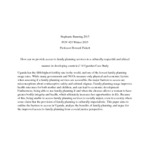| dc.rights.license | In Copyright | en_US |
| dc.creator | Banning, Stephanie K. | |
| dc.date.accessioned | 2015-09-09T17:55:07Z | |
| dc.date.created | 2015 | |
| dc.identifier | WLURG38_Banning_POV_2015 | |
| dc.identifier.uri | http://hdl.handle.net/11021/32397 | |
| dc.description | Stephanie K. Banning is a member of the Class of 2015 of Washington and Lee University. | en_US |
| dc.description | Capstone; [FULL-TEXT FREELY AVAILABLE ONLINE] | en_US |
| dc.description.abstract | Uganda has the fifth highest fertility rate in the world, and one of the lowest family planning usage rates. While many governments and NGOs measure only physical and economic factors when assessing if a family planning services are accessible, the major barriers to access are misconceptions about contraceptive safety and cultural stigmas. Family planning usage improves health outcomes for both mother and children, and can lead to economic development. Furthermore, being able to use family planning if and when she chooses allows a woman to have greater bodily integrity and health, which ultimately increases her opportunities in life. Because of this, being unable to access family planning services is socially unjust, even in a society where some claim that the provision of family planning is culturally imperialistic. This paper aims to outline the barriers to access in Uganda, analyze the benefits of family planning, and argue for the improved access to family planning from a social justice perspective. | en_US |
| dc.format.extent | 27 pages | en_US |
| dc.language.iso | en_US | en_US |
| dc.rights | This material is made available for use in research, teaching, and private study, pursuant to U.S. Copyright law. The user assumes full responsibility for any use of the materials, including but not limited to, infringement of copyright and publication rights of reproduced materials. Any materials used should be fully credited with the source. | en_US |
| dc.rights.uri | http://rightsstatements.org/vocab/InC/1.0/ | en_US |
| dc.subject.other | Washington and Lee University, Shepherd Poverty Program | en_US |
| dc.title | How Can We Provide Access to Family Planning Services in a Culturally Respectful and Ethical Manner in Developing Countries? A Ugandan Case Study | en_US |
| dc.type | Text | en_US |
| dcterms.isPartOf | RG38 - Student Papers | |
| dc.rights.holder | Banning, Stephanie K. | |
| dc.subject.fast | Birth control | en_US |
| dc.subject.fast | Family planning services | en_US |
| dc.subject.fast | Social change | en_US |
| dc.subject.fast | Communication in family planning | en_US |
| dc.subject.fast | Poverty | en_US |
| dc.subject.fast | Capabilities approach (Social sciences) | en_US |
| local.department | Shepherd Poverty Program | en_US |
| local.scholarshiptype | Capstone | en_US |
